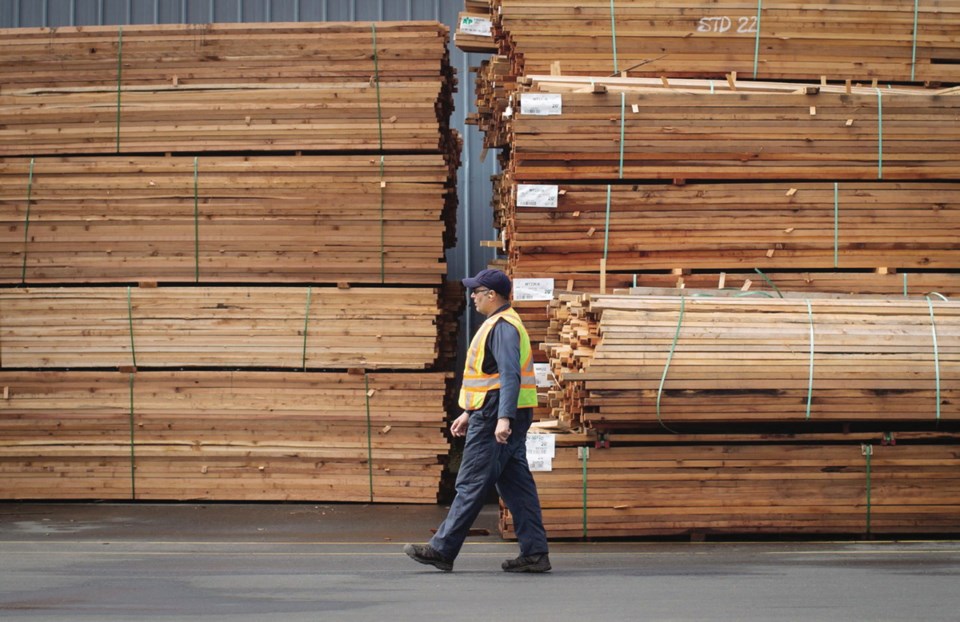Premier John Horgan blamed the American lumber industry Thursday for a U.S. government decision to impose revised duties on Canadian softwood.
Horgan said a few “greedy” lumber barons lobbied for the duties to drive up prices at the expense of American consumers who need the wood to build or renovate homes.
“It’s unfair, it’s unjust and it’s a typical pattern by a small group of industry advocates in the United States that are cutting off their nose to spite their face,” he said. “The U.S. consumer is the one that will ultimately pay the price for these tariffs. They need our product. It’s a quality product.”
Horgan said B.C., as the biggest player in the softwood lumber industry, will work closely with the Canadian government and forestry companies to get the duties overturned.
“We will continue to defend our interests,” he said. “We will prevail. We have prevailed time after time and we will prevail again.”
The U.S. Commerce department announced Thursday that most Canadian producers will pay a combined countervailing and anti-dumping rate of 20.83 per cent on softwood lumber shipments to the U.S. The rate is down from 26.75 per cent in the preliminary determinations issued this year.
U.S. Commerce Secretary Wilbur Ross said the revised duties were issued after the United States and Canada were unable to reach a long-term settlement to the dispute.
“While I am disappointed that a negotiated agreement could not be made between domestic and Canadian softwood producers, the United States is committed to free, fair and reciprocal trade with Canada,” Ross said in a statement.
“This decision is based on a full and unbiased review of the facts in an open and transparent process that defends American workers and businesses from unfair trade practices.”
Susan Yurkovich, president of the B.C. Lumber Trade Council, said the decision means B.C. companies will pay duties ranging from 20.83 per cent to 23.76 per cent.
“Unfortunately for both Canadian producers and American producers, this ongoing trade action against our industry continues to be driven by a protectionist U.S. lumber industry whose sole purpose is to constrain the imports of high-quality Canadian lumber to drive up prices for their own benefit,” she said at the B.C. legislature. “As a result, American consumers are now paying higher prices for Canadian lumber when they buy, build or renovate their home.”
Yurkovich said strong lumber prices have prevented layoffs at B.C. companies due to the duties. But she said the situation creates uncertainty for the industry and drains away money that could be invested in plants and technology.
The B.C. government said the province’s forest sector supported 60,000 direct jobs and one in four manufacturing jobs in 2016.
Liberal forestry critic John Rustad said B.C. needs to “reassert” itself as a leader on the issue. “It’s unfortunate that the premier has been misleading in his previous comments on this file, giving people hope that an easy deal was imminent and that a quick trip to Washington was all it would take to settle this once and for all,” Rustad said.
The Trudeau government responded to the U.S. decision by saying it will continue to defend the Canadian lumber industry against protectionist trade measures, including possibly turning to litigation. Foreign Affairs Minister Chrystia Freeland and Natural Resources Minister Jim Carr called the punitive duties “unfair, unwarranted and deeply troubling.”
“We urge the U.S. administration to rescind these duties, which harm workers and communities in Canada,” they said in a statement.
Carr plans to convene the Federal-Provincial Task Force on Softwood Lumber in the coming days to discuss developments.
The preliminary duties have forced Canadian companies to pay hundreds of millions of dollars in deposits, which could be refunded if they win a final ruling by the U.S. International Trade Commission around Dec. 18.
— With files from The Canadian Press



